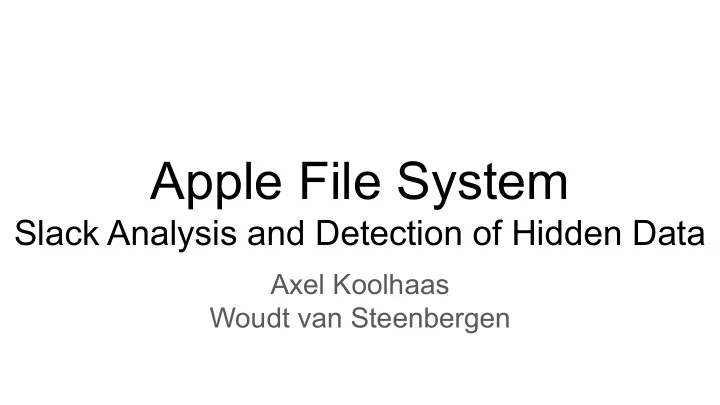

Apple File System Slack Analysis and Detection of Hidden Data Axel Koolhaas Woudt van Steenbergen
Introduction to Apple File System (APFS) ● 2016 Filesystem released, replacing HFS+ ● 2017 K. H. Hansen & F. Toolan: Decoding the APFS file system ● 2018 Official specification released ● 2018 J. Plum & A. Dewald: Forensic APFS file recovery ● 2019 T. Göbel, J. Türr & H. Baier: Revisiting Data Hiding Techniques for Apple File System Today APFS is the default filesystem in use across Apple devices: iOS, macOS, tvOS, watchOS 2
APFS partition overview 3
APFS partition overview 4
APFS partition overview container 5
APFS overview 6 Edit from source: J. Plum & H. Dewald 2018
APFS overview (ctd.) struct nx_superblock { ● Data structures may have variable obj_phys_t nx_o; length uint32_t nx_magic; ● Some objects utilise padding for uint32_t nx_block_size; uint64_t nx_block_count; processor / memory alignment, 64 ... bit or 4096 byte oid_t nx_spaceman_oid; oid_t nx_omap_oid; ● Speed > storage space Actually variable oid_t nx_reaper_oid; ● A block often only contains 1 ... oid_t nx_fs_oid[NX_MAX_FILE_SYSTEMS]; object, leaving a lot of unused uint64_t nx_counters[NX_NUM_COUNTERS]; space ... }; typedef struct nx_superblock nx_superblock_t; 7
Our research: Detection of hidden data Expand tool: AFRO 8
Overview - Slack 9
Overview - Slack 10
} Slack hiding Data structure Container Superblock } Slack 11
} Slack hiding Data structure Container Superblock } Offset Value (Little endian) 03DC <variable 2 bytes> 0520 00000008 00040001 0568 00050443 125DA440 Slack 12
Overview - Slack 13
} Slack hiding Volume Superblock Data structure } Slack 14
} Slack hiding Volume Superblock Data structure Offset Value (Little endian) 03D8 10 } 03E0 <variable 1 byte> Slack 15
Overview - Slack 16
Hiding technique: inode pad 17
Inode pad fields hiding An inode consists of: ● The key half: j_inode_key_t ● The value half: j_inode_val_t 18
struct j_inode_val { uint64_t parent_id; uint64_t private_id; Inode pad fields hiding uint64_t create_time; uint64_t mod_time; uint64_t change_time; An inode consists of: uint64_t access_time; uint64_t internal_flags; ● The key half: j_inode_key_t union { ● The value half: j_inode_val_t int32_t nchildren; int32_t nlink; }; Cp_key_class_t default_protection_class; uint32_t write_generation_counter; uint32_t bsd_flags; uid_t owner; gid_t group; mode_t mode; uint16_t pad1; uint64_t pad2; uint8_t xfields[]; } __attribute__((packed)); 19
Volatility of APFS data structures ● Data structures are not permanent ● Retired data structures are zeroed out 20
Conclusion ● Irregularities in superblock slack space are easily identifiable ○ However, the function of the unspecified fields is unknown ○ When mounting, old blocks are quickly discarded, making this volatile hiding technique ● Inode pad fields should be zero, but aren’t enforced by the APFS driver ○ Modifications are easily detectable 21
Future work ● Analyze values in superblock slack, and possibly other data structures ● Detection of hidden files that are detached from the filesystem ○ Spacemanager Bitmap (e.g. block aggregation abuse for write protection) ○ Remove inode entry from tree, erasing the file index ● Compare APFS drivers of different operating systems, e.g., macOS vs. iOS 22
Hiding technique: spacemanager? 23
Summary Hiding data within/besides APFS data structures is possible, but detectable! ● Volatile for the superblock slack ● Undefined bytes should be further researched to determine their functionality 24
Recommend
More recommend